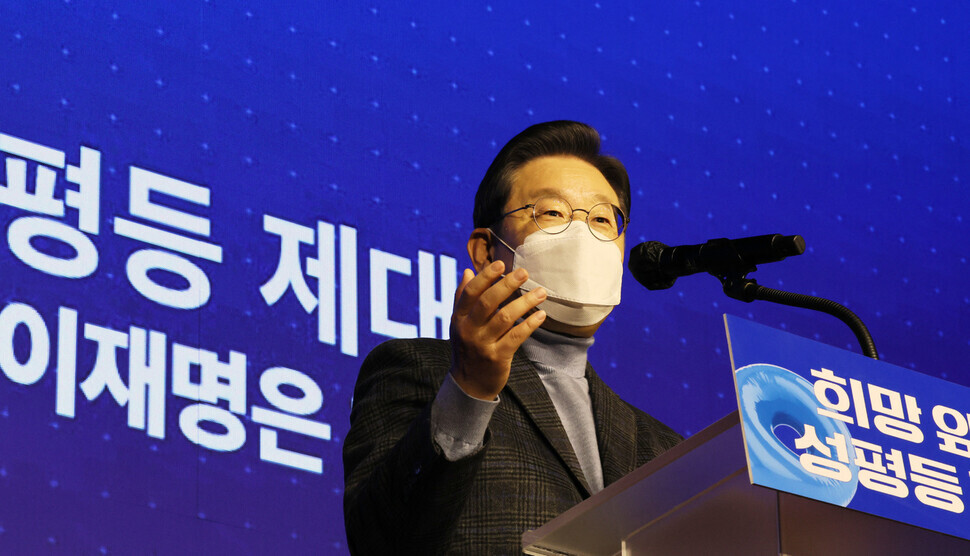hankyoreh
Links to other country sites 다른 나라 사이트 링크
Lee calls for S. Korea to adopt possibility of 2 consecutive 4-year terms for presidents

On Tuesday, Democratic Party presidential candidate Lee Jae-myung called for an amendment to South Korea's Constitution that would allow for a four-year presidential term with a limit of two terms, served successively. Lee said he would be willing to accept a shortened term if elected.
This marked the first time that a candidate has publicly presented the idea of reorganizing Korea’s power structure — an issue that had largely been avoided until now due to the low likelihood of being implemented.
During an appearance on the evening news program “MBN Newswide” Tuesday, Lee said, "The president's authority is overbearing, decentralization of power is weak, and with the single-term system, a president goes downhill as soon as they take office.”
“This results in power being exercised in a self-centered way. In order to conduct politics responsibly, a four-year term is necessary; it is a global standard,” Lee said.
But Lee stopped short of endorsing a switch to a parliamentary system, saying that he “doesn’t prefer it.”
“It’s impossible to see policymaking outcomes in just five years,” Lee added.
“I was reelected as mayor of Seongnam, and the results of that speak for themselves,” he said. “With re-elections, there will be a real midterm evaluation and the government will [be more encouraged] do its best.”
The logic behind this is that, for policy continuity and responsible politics to work, Korea’s current system of a single five-year presidential term is too short.
Lee also pointed to issues regarding how inconsistent terms for different offices mean local elections, general elections, and presidential elections don’t line up. According to Lee, adjusting the presidential term in order for lower-level elections to occur at regular intervals is the solution.
“If an agreement can be reached now, I don’t know who the next [president] will be, but amending the constitution in this way is worth it, even if [whoever is elected] serves one less year,” Lee said.
“Making this change could rewrite the country’s foundational laws and set a new direction for the future of the nation — it is that important. I’d be willing to accept [a term that is shorter],” Lee added.
This means that Lee’s term could be reduced by one year in order to have a system in which presidential and midterm elections occur at two-year intervals, similar to the US system.
However, according to Article 128 (1) of South Korea’s current Constitution, it is stipulated that “amendments to the Constitution for the extension of the term of office of the President or for a change allowing for the reelection of the President shall not be effective for the President in office at the time of the proposal.” This means that even if the next president shortens their term by one year, they will not be eligible for a four-year term.
Lee Jae-myung, however, recognized that "it is not easy to reach an agreement" on the possibility of reforms to Korea’s current power structure, adding that such an amendment “could have been made after the candlelight revolution, but the opportunity was lost.”
Lee further said that constitutional revisions should start on matters on which there is broad consensus, such as strengthening basic rights, pushing for more decentralization, strengthening basic economic rights and state responsibilities regarding the environment. If such changes are made then the power that is currently overly concentrated in a single person can begin to be decentralized, Lee noted.
By Joh Yun-yeong, staff reporter
Please direct questions or comments to [english@hani.co.kr]

Editorial・opinion
![[Column] Season 2 of special prosecutor probe may be coming to Korea soon [Column] Season 2 of special prosecutor probe may be coming to Korea soon](https://flexible.img.hani.co.kr/flexible/normal/500/300/imgdb/original/2024/0426/3317141030699447.jpg) [Column] Season 2 of special prosecutor probe may be coming to Korea soon
[Column] Season 2 of special prosecutor probe may be coming to Korea soon![[Column] Park Geun-hye déjà vu in Yoon Suk-yeol [Column] Park Geun-hye déjà vu in Yoon Suk-yeol](https://flexible.img.hani.co.kr/flexible/normal/500/300/imgdb/original/2024/0424/651713945113788.jpg) [Column] Park Geun-hye déjà vu in Yoon Suk-yeol
[Column] Park Geun-hye déjà vu in Yoon Suk-yeol- [Editorial] New weight of N. Korea’s nuclear threats makes dialogue all the more urgent
- [Guest essay] The real reason Korea’s new right wants to dub Rhee a founding father
- [Column] ‘Choson’: Is it time we start referring to N. Korea in its own terms?
- [Editorial] Japan’s rewriting of history with Korea has gone too far
- [Column] The president’s questionable capacity for dialogue
- [Column] Are chaebol firms just pizza pies for families to divvy up as they please?
- [Column] Has Korea, too, crossed the Rubicon on China?
- [Correspondent’s column] In Japan’s alliance with US, echoes of its past alliances with UK
Most viewed articles
- 1Is Japan about to snatch control of Line messenger from Korea’s Naver?
- 2‘We must say no’: Seoul defense chief on Korean, USFK involvement in hypothetical Taiwan crisis
- 3[Editorial] Korea’s surprise Q1 growth requires objective assessment, not blind fanfare
- 4Division commander ordered troops to enter raging flood waters before Marine died, survivor says
- 5The dream K-drama boyfriend stealing hearts and screens in Japan
- 6S. Korea “monitoring developments” after report of secret Chinese police station in Seoul
- 7[Column] Season 2 of special prosecutor probe may be coming to Korea soon
- 8No good, very bad game for Korea puts it out of Olympics for first time since 1988
- 9[Column] ‘Choson’: Is it time we start referring to N. Korea in its own terms?
- 10Is N. Korea threatening to test nukes in response to possible new US-led sanctions body?